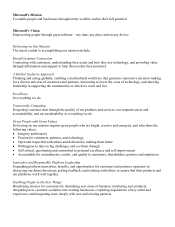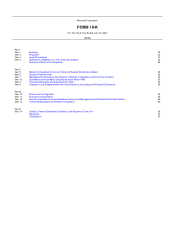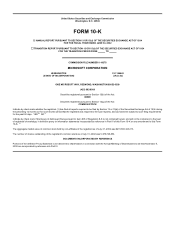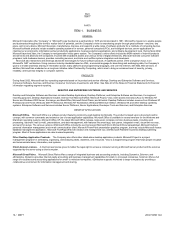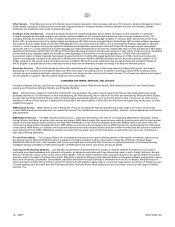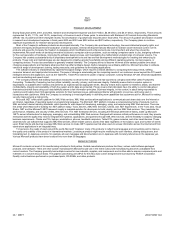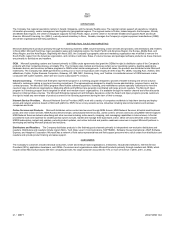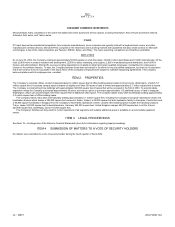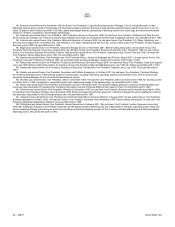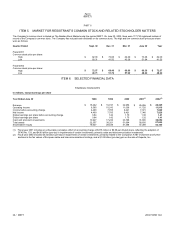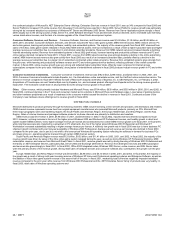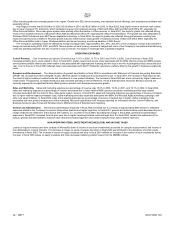Microsoft 2002 Annual Report Download - page 19
Download and view the complete annual report
Please find page 19 of the 2002 Microsoft annual report below. You can navigate through the pages in the report by either clicking on the pages listed below, or by using the keyword search tool below to find specific information within the annual report.
MSFT 21 / 2002 FORM 10-K
Part I
Item 1
OPERATIONS
The Company has regional operations centers in Ireland, Singapore, and the Greater Seattle area. The regional centers support all operations, including
information processing, vendor management and logistics by geographical regions. The regional center in Dublin, Ireland supports the European, African,
and Middle East regions, the center in Singapore supports the Asia Pacific region, and the center in the Greater Seattle area supports North and South
America. Microsoft Licensing, Inc. (MSLI), a wholly-owned subsidiary in Reno, Nevada, manages the Company’s original equipment manufacturer (OEM)
and certain organizational licensing operations.
DISTRIBUTION, SALES AND MARKETING
Microsoft distributes its products primarily through the following channels: OEM; volume licensing; online services and products; and distributors and retailers.
In fiscal 2002, Microsoft had three major geographic sales and marketing regions: the South Pacific and Americas Region; the Europe, Middle East, and
Africa Region; and the Asia Region. Beginning with fiscal 2003, the Company’s geographic sales and marketing organization was modified to remove the
South Pacific region from the Americas organization, and combine it with Asia. Sales of volume licenses and packaged software products via these channels
are primarily to distributors and resellers.
OEM. Microsoft operating systems are licensed primarily to OEMs under agreements that grant the OEMs the right to distribute copies of the Company’s
products with their computing devices, principally PCs. The Company also markets and licenses certain server operating systems, desktop applications,
hardware devices, and consumer software programs to OEMs under similar arrangements. In almost all cases, the products are distributed under Microsoft
trademarks. The Company has OEM agreements covering one or more of its products with virtually all of the major PC OEMs, including Acer, Actebis, Dell,
eMachines, Fujitsu, Fujitsu Siemens Computers, Gateway, HP, IBM, NEC, Samsung, Sony, and Toshiba. A substantial amount of OEM business is also
conducted with system builders, which are low-volume customized PC vendors.
Volume Licensing. The Microsoft Enterprise Agreement program is a licensing program designed to provide a flexible licensing and service solution
tailored to customers making a long-term licensing commitment. The agreements are designed to simplify license administration, payment terms, and the
contract process. The Microsoft Select program offers flexible software acquisition, licensing, and maintenance options specially customized to meet the
needs of large multinational organizations. Marketing efforts and fulfillment are generally coordinated with large account resellers. The Microsoft Open
program is a licensing program that is targeted for small- and medium-sized organizations. It is available through the reseller channel and offers discounts
based on initial purchase volumes. The Microsoft Enterprise Agreement and Software Assurance under the Select and Open programs provide customers
the right to install any new release of products covered in the licensing agreement during the term of their coverage.
Network Service Providers. Microsoft Network Service Providers (NSP) work with a variety of companies worldwide to help them develop and deploy
end-to-end network solutions based on Microsoft platforms. NSPs focus on key network service industries including telecommunications and wireless
companies and hosts.
Online Services and Products. Microsoft distributes online content and services through MSN Access, MSN Network Services, bCentral small business
portal, and other online services. MSN Access delivers simple, personalized Internet access, useful content, services and tools using MSN Internet Explorer.
MSN Network Services delivers advertising and other services including online search, shopping, and messaging capabilities to Internet users. bCentral
provides the tools and expertise for small-business owners to build, market and manage their businesses online. Other services delivered online include
MSDN subscription content and updates, periodic product updates, and online technical and practice readiness resources to support Microsoft partners in
developing and selling Microsoft products and solutions.
Distributors and Resellers. The Company distributes products in the finished goods channels primarily to independent non-exclusive distributors and
resellers. Distributors and resellers include Ingram Micro, Tech Data, Level 3 Communications, SOFTBANK, Software House International, ASAP Software
Express, and Happinet Corporation. Microsoft has a network of field sales representatives and field support personnel who solicit orders from distributors and
resellers and provide product training and sales support.
CUSTOMERS
The Company’s customers include individual consumers, small- and medium-sized organizations, enterprises, educational institutions, Internet Service
Providers (ISPs), application developers, and OEMs. Consumers and organizations obtain Microsoft products primarily through resellers and OEMs, which
include certain Microsoft products with their computing devices. No single customer accounted for 10% or more of revenue in 2000, 2001, or 2002.



